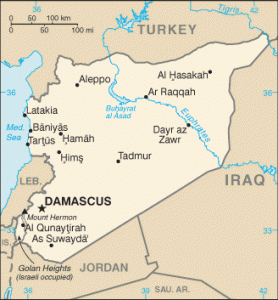The chaos and violence in Syria has created tension in neighboring Lebanon since the start of the uprising 11 months ago, but now actual fighting has broken out.
 In the northern Lebanese city of Tripoli, gunmen exchanged automatic weapons fire and volleys of rocket-propelled grenades for hours across a dividing street that separates two neighborhoods. In one, Sunni Muslims reside and have a strong hatred of the Alawite regime of Syria’s Bashar al-Assad. In the other neighborhood reside members of the Alawite sect, who strongly back Assad.
In the northern Lebanese city of Tripoli, gunmen exchanged automatic weapons fire and volleys of rocket-propelled grenades for hours across a dividing street that separates two neighborhoods. In one, Sunni Muslims reside and have a strong hatred of the Alawite regime of Syria’s Bashar al-Assad. In the other neighborhood reside members of the Alawite sect, who strongly back Assad.
The fighting took place overnight, but a precarious truce was reached on Saturday after two casualties – one from each side – and 12 people wounded, most of them soldiers.
The skirmish illustrated powerfully how easily the violence in Syria could spill over into neighboring countries. Lebanon is deeply divided on the Syria issue, and there have been reports of aid to the Syrian opposition coming from over the border. But similar issues exist for neighboring Turkey and Iraq as well.
Syria is a very important part of Lebanese politics and society. There are many pro-Syrian Lebanese political parties and politicians, in addition to considerable support for the regime among the public. Simultaneously, there is deep fear and resentment of the Syrian regime due in part to Syria’s virtual rule and occupation over Lebanon from 1976 to 2005.
“The Syrian regime holds a lot of cards in Lebanon, and the biggest fear is that as the Assad regime gets more desperate, it would decide to use them to create regional chaos,” anti-Syrian politician Mustafa Alloush said.
“Among those cards,” writes Zeina Karam in the Associated Press, “is Hezbollah, the Syrian and Iranian-backed Shiite militant group with an arsenal of weapons more powerful than that of the Lebanese army.”
The violence in Syria has already stoked these complicated divisions in Lebanon and further instability – like an increasingly threatened Assad regime, or an international intervention into Syria – has the potential to spark a regional conflagration that may spread to greater disaster.


